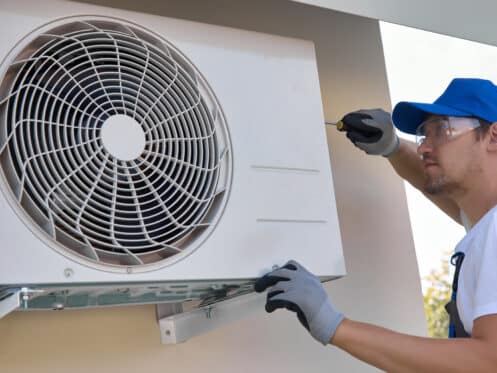While there are many effective ways to heat your Fresno, CA home, some methods are far more efficient than others. Heat pumps are fast-gaining recognition for their modest carbon footprints, multi-functionality, and modern, feature-rich designs. If you’ve been using a furnace to keep everyone warm, there’s good reason to consider upgrading to a heat pump. However, it’s important to consider both the benefits and drawbacks of this switch before making your move.
What Is a Heat Pump
You’ve probably seen a heat pump in action before. Many homeowners throughout California have already replaced their furnaces with heat pumps, and much like air conditioners, heat pumps have outdoor condenser units that are installed in back or side yards. When driving down your block, you might notice that heat pumps are already being used on several neighboring properties.
During summer, heat pumps are functionally identical to ACs. These units extract warm air from the interior of buildings and pass it over their refrigerant-filled coils. The refrigerant within these coils absorbs the air’s heat, and then the chilled air is cycled back inside. Hot refrigerant travels to the outdoor condenser unit to release its heat, and the entire process begins again.
In winter, heat pumps function in reverse. Air-source heat pumps harness heat from the outside air and funnel it indoors via their refrigerant. Rather than releasing its heat outside as it does in the summer, hot refrigerant releases heat in the building interior.
Heat Pumps Don’t Burn Any Fuel
Throughout the nation, fuel-combusting furnaces were once the norm. Although natural gas appliances are being gradually phased out by some states and municipalities, many Fresno locals still heat their homes with natural gas.
Unlike combustion furnaces, heat pumps don’t burn any fuel at all. All of their operations are powered by electricity. As such, they don’t directly produce or release harmful emissions in the form of exhaust gases. This makes heat pumps inherently safer than oil-fired and gas-fired heaters by eliminating the risk of carbon monoxide (CO) exposure.
Heat Pumps Have Outstanding Efficiency Ratings
The heat transfer process that heat pumps use is easily one of the most efficient heating methods currently available to residential property owners. Heat pumps don’t burn fuel to produce heat or use electricity to heat coils. In the right operating conditions, a heat pump can often supply 300% to 400% more heat energy than it consumes in electricity.
Upgrading to a Heat Pump Could Qualify You for Impressive Tax Rebates
Choosing a heat pump for your home’s fixed heating solution could qualify you for impressive tax rebates and other incentives that have been earmarked for efficiency upgrades. Under the Inflation Reduction Act of 2022, homeowners who install qualifying heat pumps can obtain $2,000 in federal tax credits or up to 30% of their total installation costs. While similar tax credits apply to some high-efficiency furnaces, the financial rewards for these appliances are far less substantial.
Installing a Heat Pump Will Keep You on Par With Regulatory Standards
California is doing its part to lead the way in achieving zero emissions. With ambitious goals for the future, California legislators are working hard to draft laws that minimize or prohibit the sale and installation of gas appliances. Although federal courts have stalled the outright ban of natural gas furnaces and stoves in the state, the fight to do so persists.
There are many good reasons to switch from natural gas heating to an electrically powered heat pump now rather than waiting until the options in home heating equipment are restricted. As more HVAC companies prioritize the installation of heat pumps and electric furnaces, the availability of high-performing gas appliances could wane over time.
Having a heat pump installed could additionally make your home more marketable. Many savvy investors in Fresno are looking for modern and highly efficient upgrades like heat pumps.
Efficiency Ratings Don’t Determine Operating Costs
Being more efficient doesn’t always mean being cheaper to use. This is certainly the case with heat pumps. Having natural gas furnaces allows homeowners to enjoy the significantly lower cost of this fuel. Throughout the nation, electricity rates are consistently much higher than the rates for natural gas.
Furnaces Provide Even and Consistent Heat
Furnaces trump heat pumps in one area: consistent heating. Heat pumps require adequate outdoor heat to keep building interiors warm. When outside temperatures are near freezing, these units often have a hard time sourcing enough warmth to bring inside. This causes their normally exceptional efficiency levels to decline, and it sometimes leaves consumers with living spaces that are less than comfortable or downright unsafe. Comparatively, furnaces have a reputation for providing even and consistent heating in all conditions.
Fortunately, winter weather in Fresno rarely brings below-freezing temperatures. With nighttime temperatures ranging between 38 and 45 degrees Fahrenheit from December to February, even entry-level heat pumps can do their jobs with limited electricity.
Both Furnaces and Heat Pumps Serve Multiple Purposes
Both furnaces and heat pumps serve multiple purposes. Each of these heater types warms building interiors, filters the indoor air, and regulates humidity. You can use either to keep your home from feeling oppressive and muggy and to sidestep IAQ-related issues like coughing, sneezing, wheezing, and itchy, watery eyes.
You Can Use a Heat Pump Year-Round But a Furnace Will Only Help in Winter
Only heat pumps are dual-use. Having a natural gas furnace installed won’t promote indoor comfort during the late spring and summer months when the outside weather is scorching. A heat pump can perform just as efficiently in summer as a traditional air conditioner can. It will offer comparable or higher levels of efficiency while requiring the same level of maintenance.
Comparing the Maintenance Requirements of Furnaces and Heat Pumps
Furnaces require professional maintenance service at least once annually. They also need regular filter changes. To keep your furnace in good condition, you should inspect its filter monthly and change it every 30 to 90 days.
The maintenance requirements for heat pumps are similar. Heat pumps should have their air filters inspected monthly and changed every 30 to 90 days. However, if you choose to use your heat pump for both heating and cooling, you’ll need to have it professionally serviced before the cooling season and again before the heating season arrives.
Which Option Is Best for Your Fresno Home?
Deciding whether to install a heat pump or a new furnace isn’t an easy choice. There are many furnace types to choose from, including gas-fired furnaces, electric furnaces, and variable-speed models with electronically commutated motors (ECMs). Each of these options comes with its own benefits and drawbacks, and each stacks up to heat pumps a bit differently.
There are also installation-related challenges to consider. For instance, new construction in Fresno and other California cities often leaves little room in back and side yards for the amount of clearance that heat pump condensers require. All heat pumps and AC condensers need at least two feet of clearance on all sides. If your yard isn’t large enough to comfortably accommodate the installation of a full-size heat pump condenser, furnace installation is easily the better choice.
We help residents of Fresno, CA and the surrounding communities make informed decisions about their home heating systems. We also offer quality heating equipment to support their project goals. Our clients can count on us for expert heating, cooling, plumbing, and indoor air quality services. We additionally provide home energy audits and duct cleaning. To find out more about using a heat pump or to schedule an appointment, contact Allbritten now.



